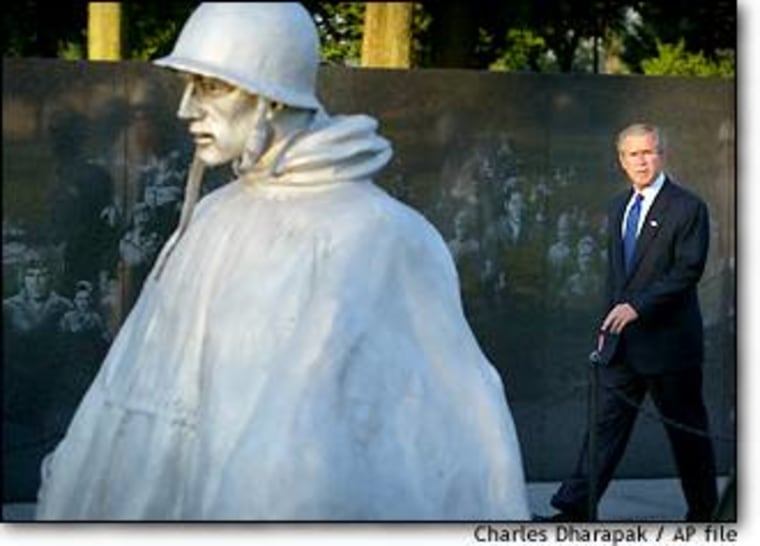The decision by President Bush to embrace a loosely constituted security pledge to North Korea in hopes of coaxing the communist state into abandoning its nuclear weapons is the latest twist in an American policy that, like much of the North Korean population, has had to sustain itself on crumbs.
The offer to the impoverished and unpredictable dictatorship, presented by Bush on Sunday to China’s President Hu Jintao during the Asia-Pacific Economic Cooperation forum in Bangkok, seeks to meet halfway what long has been a key demand of the North Korean regime in the decade long American effort to reign in its nuclear ambitions: a formal non-aggression pact.
Bush, along with his National Security Advisor Condoleezza Rice and Secretary of State Colin Powell, sought and won support for the idea from Asian leaders at the summit. As the summit closed Tuesday, the APEC host, Thai Prime Minister H.E. Thaksin Shinawatra, read a statement from the 21 member nations pledged to “seek a peaceful resolution through dialogue while addressing all concerns of parties including the security concerns expressed by the DPRK (North Korea.)”
The assurances in question, however, would presumably go beyond that. Bush’s proposal, while still vague, envisions specific security guarantees from the five-nation group that hosted talks on the North Korea nuclear issue in December — Russia, the U.S., China, South Korea and Japan.
Details of what North Korea might want in such a statement might begin to emerge this weekend, when Rep. Curt Weldon, a Pennsylvania Republican active on Korea issues, leads his second congressional delegation this year to the North.
“We’re hoping to hear more about what they expect, and to see if it is possible to avoid a war,” says Weldon, who presented a proposal to North Korea’s leadership earlier this year credited with jump-starting the nuclear talks. Weldon’s proposal included a proposed non-aggression “pledge” and was first reported by by MSNBC.com last June.
CRASHING THE PARTY
North Korea, never invited to meetings of the Asia-Pacific Economic Cooperation forum, where Bush is Tuesday, nonetheless always makes its presence felt. This year’s ploy: the test of a short-ranged naval missile, most likely a Chinese-made “Silkworm,” just as the conference opened over the weekend.
Bush tried to emphasize diplomacy and hopeful signs as the conference began, however, making sure his decision to soften his previous rejection of the idea of a “non-aggression pact” was the headline in the world’s newspapers. But already had publicly declared the United States was not interested in “regime change” in North Korea, but has refused to sign any formal non-aggression treaty. He reiterated that position in Bangkok, telling reporters “We will not have a treaty, if that’s what you’re asking. That’s off the table.”
But Bush’s proposal is the best evidence yet that the U.S. is aggressively pursuing a diplomatic end to the Korean standoff. Against the advice of more hawkish members of his administration, the president appears to be determined to avoid a clash with the North — at least as long as American forces remain tied up in post-war Iraq.
Pentagon officials and many conservatives generally have questioned whether any agreement with the North is worth the paper it is written on given the North’s violation of the “Agreed Framework
” treaty signed with the U.S. in 1994. The North since has acknowledged pursuing such weapons and even building several, and last January it pulled out of the nuclear Non-Proliferation Treaty.
Even those who support the diplomatic effort acknowledge this problem.
“North Korea is not like Iran, where facilities are documented and you have dissidents supplying tips to the (International Atomic Energy Agency),” says Dr. Raymond Zilinskas, a former UNSCOM inspector now with the Monterrey Institute for International Studies. “In North Korea, everything is underground and there’s no equivalent to the Iranian dissidents. It’s a much more difficult thing to verify compliance.”
HARD-LINE LOBBYING
For these reasons, the more hawkish voices at the Pentagon, would like to move forward with economic sanctions against North Korea and increased threats of military action unless the regime pledges to abandon nuclear weapons.
Weldon, a staunch supporter of Bush administration defense policies generally, says he has found himself “in the middle of a fight between State and Defense over what Korea policy should be.”
“If there is a window of opportunity to avoid war, we must take it, because there are no good options in North Korea,” Weldon says. “The hawks want the embargo, which failed with Castro, with Saddam and others. I’m afraid that would only encourage (North Korean ruler) “Kim Jong-il to export more missiles abroad, and, heaven’s forbid, nuclear weapons.”
Since the Korean War of 1950-53 ended with an armistice and not a formal peace treaty, the North has long included a non-aggression treaty as part of any deal that would lead to an opening with the United States. But American diplomats note that signing such a treaty would directly contradict mutual defense pacts already in place with Japan and with South Korea.
The history of non-aggression treaties suggests they are of little use, legally or in practice, if one of the signatories feels its security is threatened by the other. Indeed, perhaps the most famous such treaty was the Molotov-Ribbentrop Pact of 1939, signed by the foreign ministers of Nazi Germany and the Soviet Union. While the treaty pledged non-aggression and agreed on a carve up of Poland and parts of Romania, less than two years later the two signatories fought the bloodiest war in history against each other.
